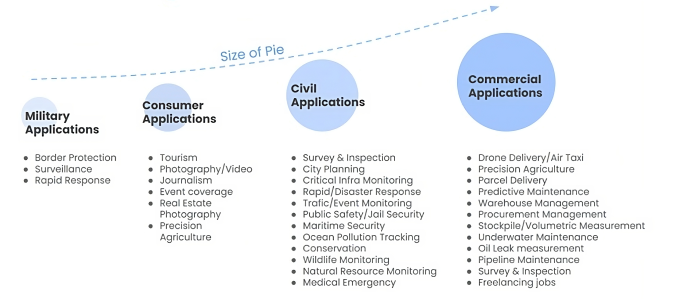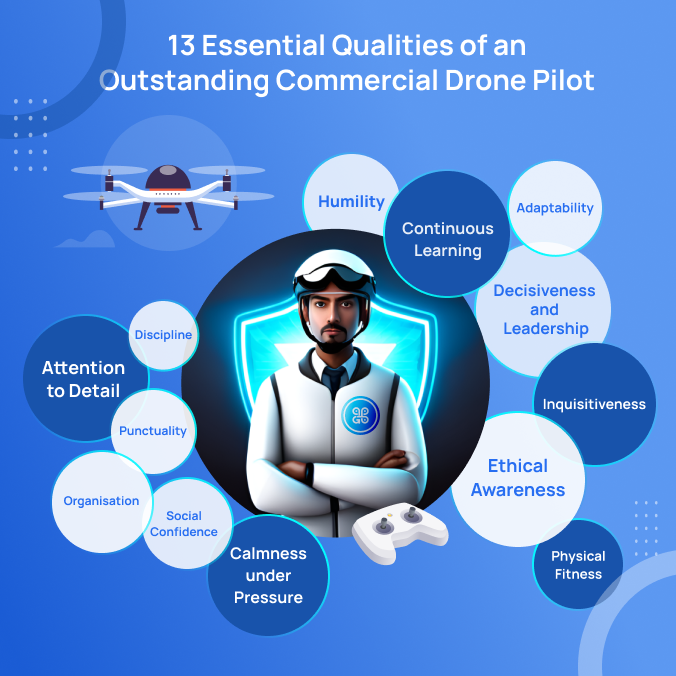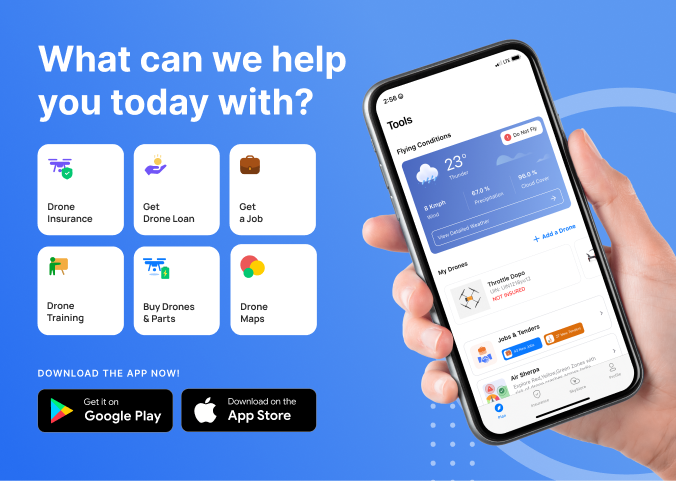Drones are changing the way we monitor, manage & move around. As the Indian Drone industry continues to grow in 2023, there is an upsurge in the demand for certified drone pilots. The rapid adoption of drones across different industries & emerging use cases, has led companies to increasingly seek DGCA Certified Drone Pilots. While DGCA Certified drone pilot certificate is a basic requirement to testify piloting skills, employers are now looking for additional qualities that make a great commercial drone pilot.

In India, leading DGCA Approved Remote Pilot Training Organizations (RPTOs) offer certified remote pilot training programs.
These comprehensive Drone Pilot Training Courses aim to enhance your technical capabilities as a certified drone pilot while also focusing on developing certain essential qualities that are crucial for long term success in the field.
By undertaking these training programs, you will not only become a DGCA Certified Drone Pilot but also improve on the competencies required to become successful. Below are the key characteristics that separate a drone pilot from a good drone pilot.

Commercial drone pilots must be detail-oriented. One must follow Checklists, Logbooks, establish safety procedures, and remain vigilant to changes in weather or safety conditions. Maintaining the drone and its software also requires dedication and meticulousness. Cutting corners or skipping steps can jeopardize the effectiveness and safety of a commercial drone pilot.
Drone pilots frequently interact with the public & within the team, answering questions about their equipment, flying techniques, and purpose. Maintaining composure when onlookers observe performing complex tasks or ask questions, is a key expectation from a proficient drone pilot.
Flying a drone can be stressful and can lead to severe consequences. Weather, geographical conditions, project timelines, drone malfunctions are some of the factors that contribute to pilot stress while flying a drone. It is extremely important for a good drone pilot to not get triggered and be able to effectively manage stress before and during a flight.
Commercial drone pilots must fully comprehend the consequences of their actions. Drones are considered aircraft by the DGCA, so adherence to rules and regulations is vital. A good drone pilot does not take shortcuts and always considers the potential outcomes of their decisions.
Majority of drone operations are pre-planned and require coordination across different teams or individuals. In some use cases, drone operations are time-sensitive and require precise data collection at specific moments. A responsible drone pilot must arrive early at the site to conduct thorough assessments of the surroundings, weather conditions, potential hazards, and equipment functionality. Arriving late may lead to rushed procedures, increasing the likelihood of accidents.
Maintaining procedural discipline and ensuring safety and consistent performance require careful planning. Successful drone operators create mission plans and develop methods to organise, label, and store their equipment effectively. Organisation skills thereby become a desired quality in a drone pilot.
Flying a drone involves inherent risks, and companies are accountable for their pilots' actions. Employers must ensure that their commercial pilots are competent, safe, and well-trained. Overconfidence and a disregard for proper procedures can lead to accidents or damage. A good drone pilot acknowledges the possibility of accidents, avoids overestimating their abilities, and maintains confidence while adhering to protocols.
Owing to a rapidly evolving drone technology and flight regulations in India, a good drone pilot is expected to continuously learn and adapt. If you're a DGCA Certified commercial drone pilot, curiosity and a thirst for knowledge are essential to be industry relevant. Identify the definitive sources for answers in the drone field and be prepared to seek help, collaborate, and actively search for solutions as you enhance your skills.
Like manned aircraft pilots, excellent drone pilots gather and analyse data. They ask questions to gain a comprehensive understanding of a situation. A Certified Drone Pilot assesses flight locations, gathers relevant information, and makes informed decisions based on specific flight requirements.
A DGCA Certified Drone Pilot understands their strengths, weaknesses, and personal limits. They can assess situations and know when not to fly. When pressure mounts to complete a flight, a safety-conscious pilot can make the difficult decision to call it off, providing precise reasons for doing so. It is best to ward off overconfidence and over commitment.
A commercial drone pilot must embrace their role as the Pilot in Command (PIC). As the decision-maker, the PIC is accountable for the outcomes of their decisions and those of their crew. Making sound Go/No Go decisions and establishing flight limitations are crucial skills. A great commercial drone pilot can assume leadership and guide their crew effectively, ensuring the safe completion of each flight.
One of the most important, yet often overlooked aspects in drone operators’ personality is the ability to be empathetic to their surroundings. A good drone pilot is expected to be mindful of the flying environment, have cultural or local sensitivities, respect privacy by maintaining professional conduct and taking humane judgements wherever required.
Commercial drone operators are required to fly in varying weather and geographical conditions. While fitness is not the most important for a successful drone pilot career, it adds tremendous value to be able to endure demanding use cases. For treacherous drone flights, companies look for the most able drone pilots.
Before pursuing a career as a commercial drone pilot in India, take the time to evaluate if you possess the necessary qualities. You could always inculcate the above mentioned qualities to fly a successful drone career.

Download for Android : TropoGo - Drone Jobs & Tools - Apps on Google Play Download for iOS : TropoGo - Drone Insurance & Jobs on the App Store